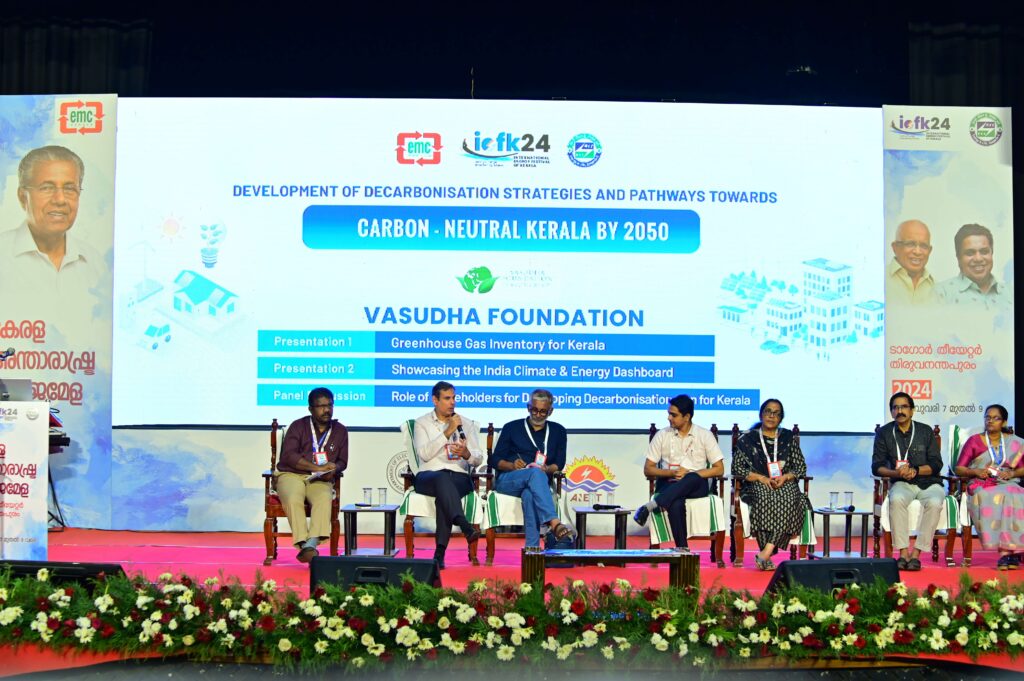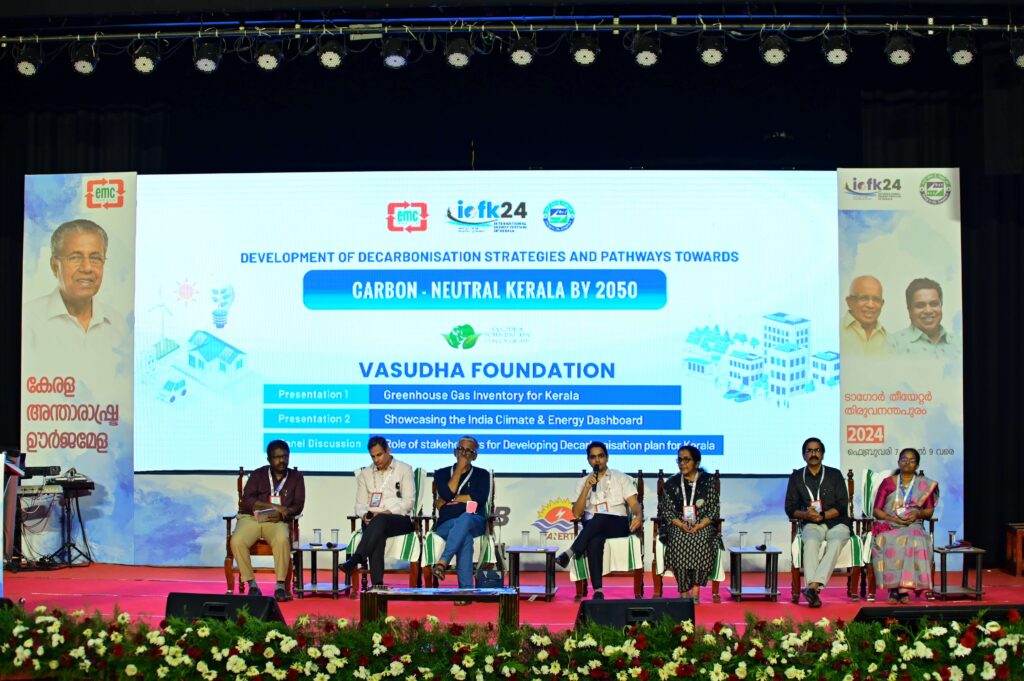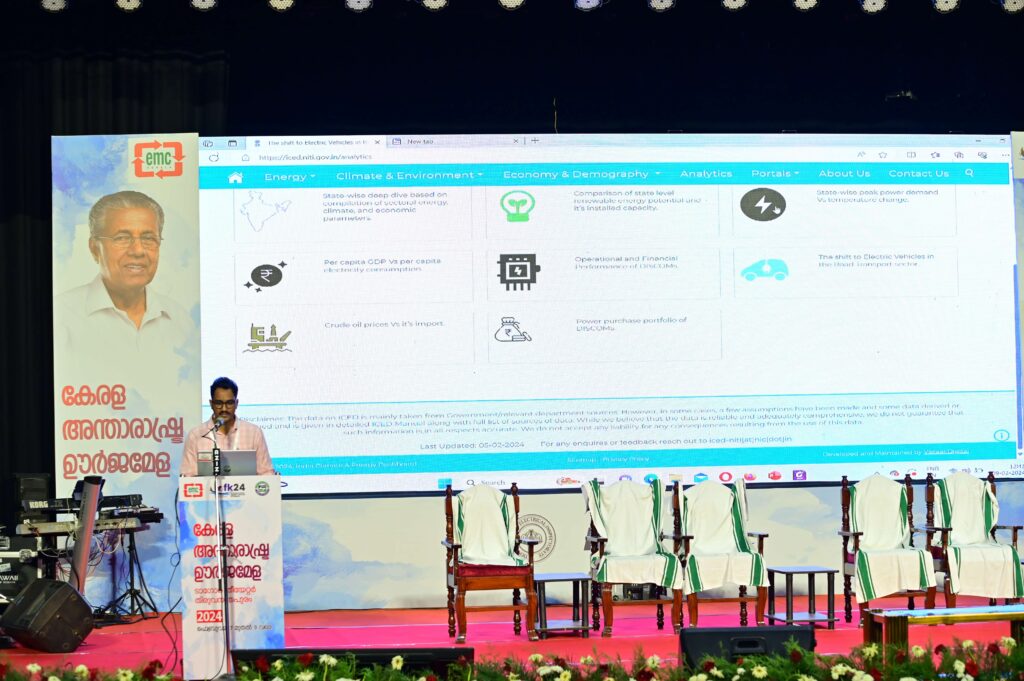9th February 2024 | Tagore Theatre, Thiruvananthapuram
Vasudha Foundation organised a workshop on “Development of Decarbonisation Strategies and Pathways towards Carbon Neutral Kerala by 2050” at the First International Energy Festival of Kerala hosted by the Energy Management Centre, Govt. of Kerala, on 9th February, 2024, at Tagore Theatre, Thiruvananthapuram. The workshop was organised in partnership with the Energy Management Centre, Government of Kerala, and the Directorate of Environment and Climate Change, Govt. of Kerala.
Team Vasudha kicked off the workshop with two presentations. One that showcased the Greenhouse Gas Emissions profile for Kerala, which covered trends and contributions of key sectors and categories, a project that is nearing completion, and the other showcased the India Climate and Energy Dashboard (ICED), developed by Vasudha Foundation in partnership with the NITI Aayog. An exhaustive list of datasets available on the dashboard, and data analytics specific to Kerala on its power procurement portfolio were presented, amongst others. In addition, draft economy wide as well as sector-specific GHG emission profiles and trends were also showcased. The presentation emphasised the role of open-source datasets and its benefits to policy makers, academia and the public in making informed decisions.
The presentations were followed by a panel discussion on ‘Role of Stakeholders for Developing Decarbonisation/Carbon Neutral Plan for Kerala’. The discussion was moderated by Mr. Suneel Pamidi, IFS, Director of the Directorate of Environment and Climate Change, Govt of Kerala. The panel had experts from various sectors and departments, namely, Dr V Beena, Centre for Animal Adaptation to Environment and Climate Change Studies; Mr Jayakumar C, Director, Thanal; Mr Praveen K S, Superintending Officer, Kerala Water Authority; Mr. V.N. Prasad, Chief Engineer, Renewable Energy and Energy Savings, Kerala State Electricity Board; Ms. Salini P N, Senior Scientist, NATPAC; and Mr Raman Mehta, Program Director at Vasudha Foundation.
Key takeaways from the session
- To preserve the potential of the forestry sector in carbon sequestration, it is imperative that anthropogenic pressure is reduced and the diversion of forest areas is prevented. Moreover, there lies immense scope in increasing the density of forests to increase their sequestration potential.
- Within and outside the forests, wetlands have a huge carbon sink potential. Thus, it is important to focus on their protection.
- Kerala’s renewable energy installed capacity is bound to touch 1000 MW and policies within the state are helping it scale. With the SOURA scheme focussed on solar rooftops, Kerala’s solar rooftop is expected to exponentially grow with policy aiding consumers with fiscal incentives and energy banking facilities with the utility.
- It is vital to focus on both fronts of electric mobility infrastructure as well as the source of electricity that powers electric vehicles. The share of renewable energy in the electricity mix should be in sync with the rise in power demand due to the addition of electric vehicles to the transportation fleet.
- Moving freight transport through inland waterways will significantly help in curbing emissions from road transportation, and may also be an efficient mode to move cargo. In its 2023-24 budget, Kerala has already announced a project aimed at transforming the West Coast Canal (WCC) into an economic trade corridor.
- Sustainable infrastructure development, improved connectivity, and focus on non-motorised transport and public transportation networks, combined with behavioural changes in road users will significantly help in curbing emissions in the transport sector.
- The potential of wastewater as a source of energy must be explored. For example, the utilisation of recovered nutrients from wastewater for fertilisers in the agricultural sector could potentially reduce the demand for fertilisers.
- From the viewpoint of the water cycle, from extraction until disposal, roughly 0.5 to 5 kWh of energy per m3 is required. All stages, namely, extraction, treatment, distribution, collection, and disposal of wastewater, must be looked at holistically for reducing the carbon footprint.
- Additions to the next generation of livestock can be made based on their thermo-tolerance, emissions per litre of milk produced, and/or other genetic markers. This will help in significantly reducing emissions from livestock. Similarly, licenses issued to large farmers could be made contingent on the carbon-neutral status of their farms.
- To the possible extent, integrated/mixed farming can be promoted and effective mechanisms for manure processing can be introduced.
- The need for collaboration amongst stakeholders across sectors in the state remains central in the carbon-neutral journey. An empowered authority/committee/commission can be considered for ensuring the required coordination among departments and stakeholders, including scientists, engineers, technicians, policymakers, academic institutions etc.







